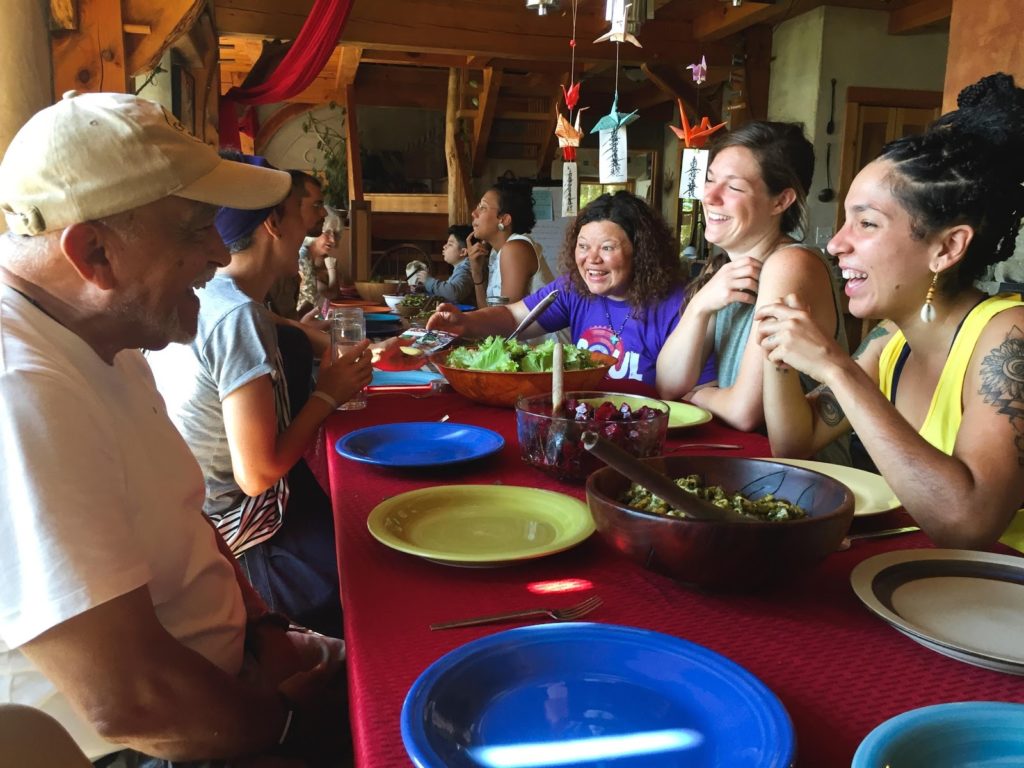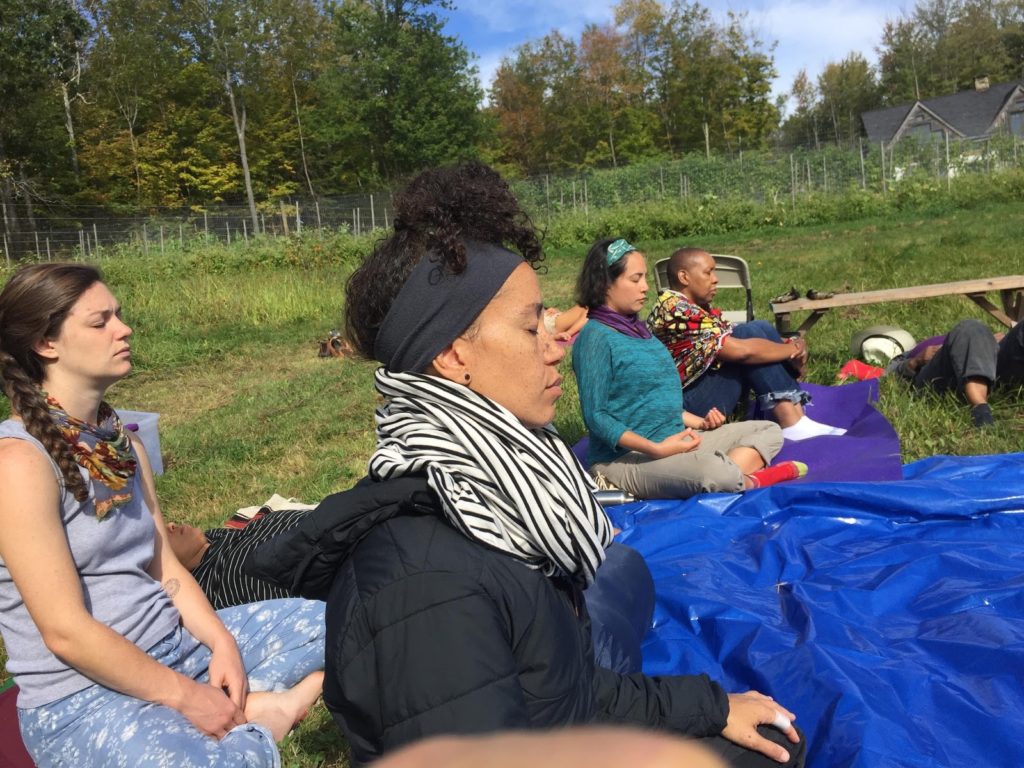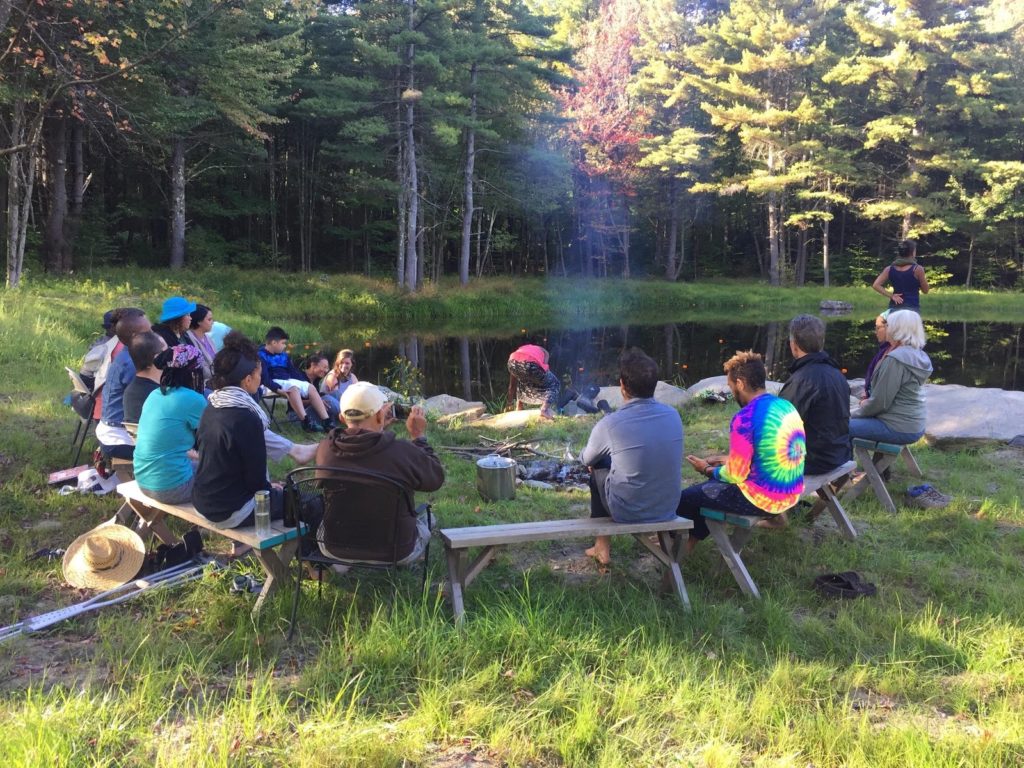In September 2017, Zen Peacemakers Roshi Paco Genkoji Lugoviña and Zen Peacemakers Minister Ariel Pliskin organized the retreat “Bearing Witness to Land, Food, and Race” with Soul Fire Farm in Petersburg, New York, US. The retreat focused on the intersections of food production, racism in the US, and spiritually- and physically-grounded ways to achieve racial and food justice. The retreat will be offered again in September of 2018.
Zen Peacemakers Staff Anthony Saracino interviewed Roshi Lugoviña and Rev. Pliskin in February and March 2018.
PLANS AND BACKGROUND
“The idea for the retreat was born out of a conversation Ariel Pliskin and I had three to four years ago in Poland,” Paco says. The two had gone together to bear witness at the concentration camp site at Auschwitz-Birkenau, though the Land, Food, and Race retreat drew from many experiences the two had had bearing witness on city streets and elsewhere.
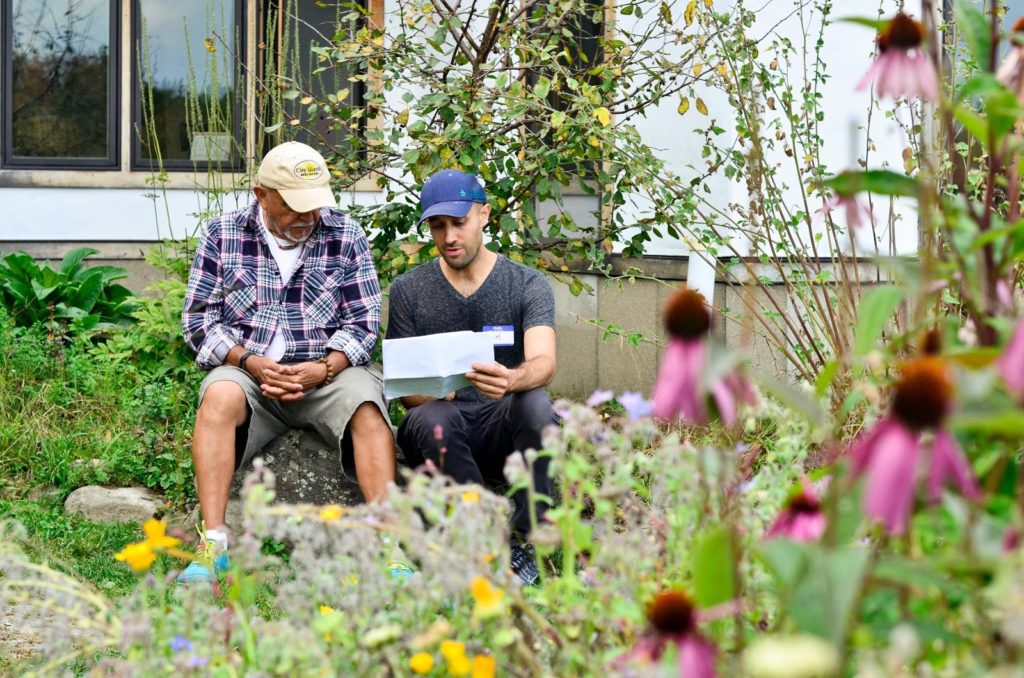
For Ariel, “It started in the streets. When we ate in the soup kitchens, we’d be treated with lots of love, but not dignity. There was this divide between those serving and those being served. So the Zen Peacemakers decided to make a cafe…to bring together people who could and could not afford food, in a spirit of interconnection. Bernie started the program in Montague Massachusetts and I brought it to Greenfield where it became Stone Soup Cafe. It has been going since 2012.
“From working with Stone Soup I started understanding the food system more deeply. In addition to bearing witness to the separation between those serving and being served, I saw there were other invisible or anonymous parts of the food system: who’s growing the food? Where? How? What impact does the growing have on the natural environment? I started to understand that preparing and serving food is part of this much larger web of relationships.”
Ariel is of Argentine descent and bonded with Paco, who is Puerto Rican, early on in his time with Zen Peacemakers. “From my understanding of Zen, words may point to true reality but they are not reality itself,” Ariel says. “That includes racial categories, for me. They’re constructed in a social context and are not fundamentally real. On the other hand, they are real in that people perceive them, and that influences a whole variety of things in our lives including discrimination and privilege.
“As time went on and I continued to do this work, I started to discover ways that my perspective was limited by my whiteness, ways that our whole society is organized around affirming and reinforcing the white perspective that I also have. I found another opportunity to bear witness to an element of interconnectedness in our society: by witnessing voices of people of color in food work.”
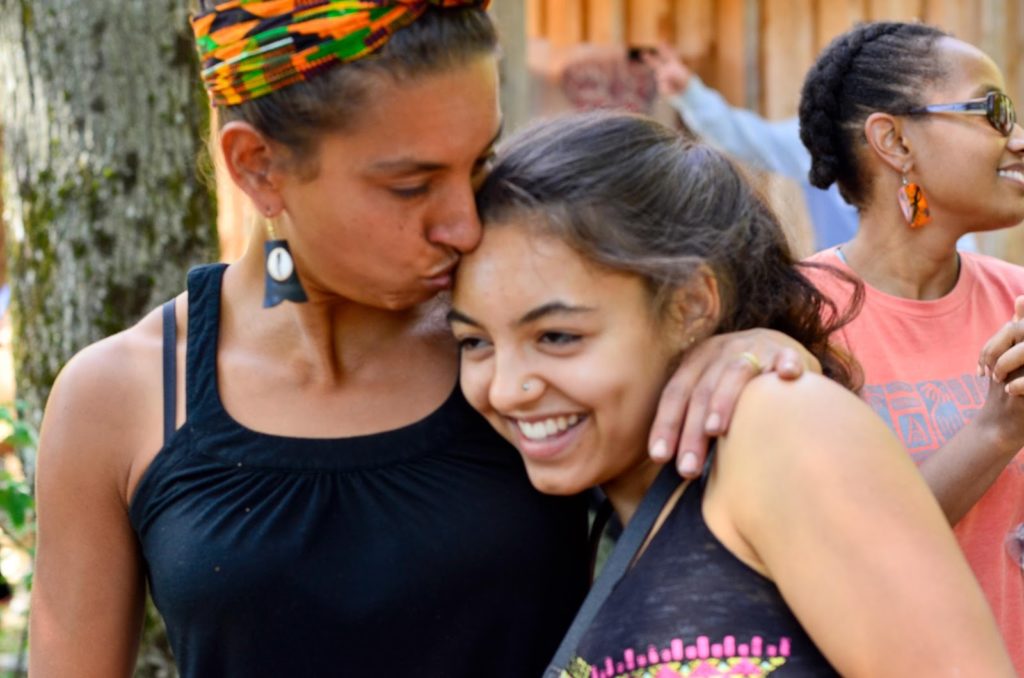
It took searching to find a host farm for the event, but Soul Fire Farm in Petersburg NY proved a good fit. “One of the reasons that Soul Fire works as a partner is that they have a strong spiritual foundation,” Ariel said. “They, like us at Zen Peacemakers, have noticed people who are very socially-engaged but are unsatisfied or burned out.” Soul Fire’s founder, Leah Penniman, has a leadership background in Ghanian and Haitian Vodoun religions, as well as Judaism. The farm was designed with a commitment to ending racism and injustice in the food system, along with a spiritual intention. From their website:
We raise life-giving food and act in solidarity with people marginalized by food apartheid. With deep reverence for the land and wisdom of our ancestors, we work to reclaim our collective right to belong to the earth and to have agency in the food system.
Seventeen participants joined the retreat. With funding support from the Frederick P. Lenz Foundation for American Buddhism, Paco and Ariel were able to accept registration fees on a sliding scale and offer some scholarships.
“It was the brownest-skinned group of participants of any bearing witness retreat I’ve been to, as well as the youngest and the queerest,” said Ariel. A requirement of Soul Fire was that the participants be more than 50% people of color. He explained, “Because white people enjoy privilege in society, voices of people of color may not be well-listened-to or represented in mixed spaces, even when the intention is getting rid of racism. Soul Fire felt that having a slight majority of people of color would create a sense of safety that is more inviting to them.” Individuals of African, Latin, Asian and Native American descent participated in the retreat, representing a variety of spiritual backgrounds including Haitian Vodoun, Unitarian Universalism, Christianity, Judaism, Buddhism, Paganism and others.
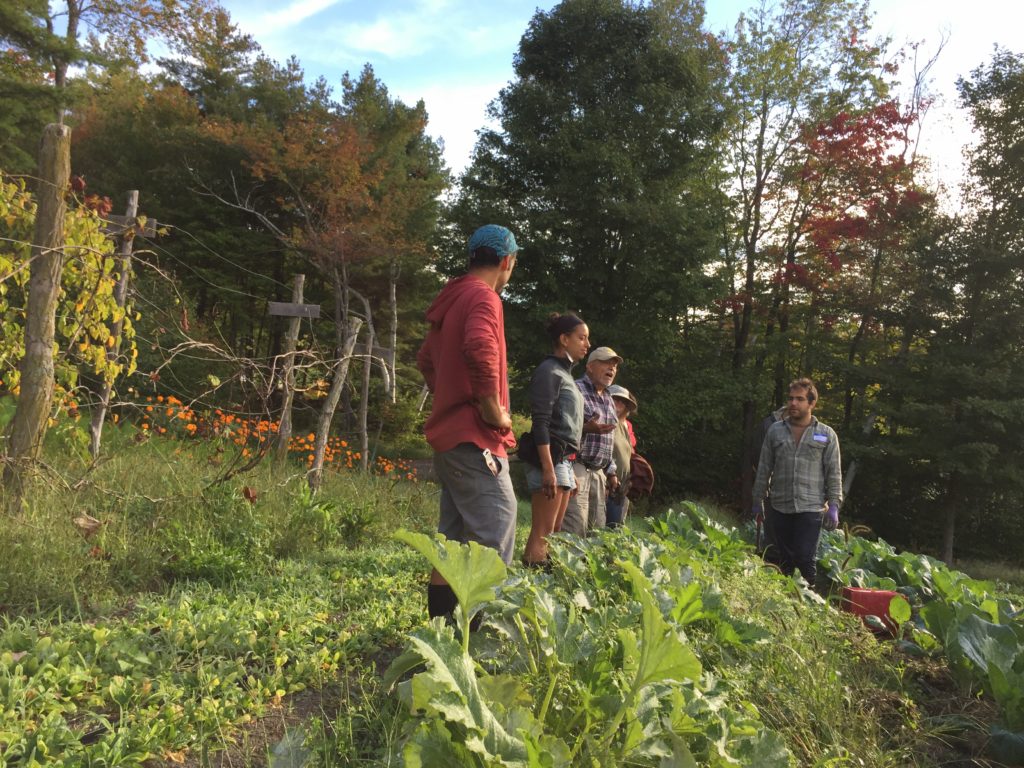
RETREAT SCHEDULE: EMBODIED, EMBEDDED, ENGAGED
Ariel explained that the retreat schedule was designed to encourage participants to be embodied in movement practices like yoga; embedded in the historical context of a post-slavery United States where racism continues, in a spiritual foundation, and in community; and engaged in Soul Fire’s social justice education and organizing, such as their efforts to help people of color acquire and cultivate land.
Towards these goals, the retreat schedule consisted of a mixture of meditation, council circles, farm work, food justice education, and ritual offerings from the different traditions represented by the leaders and participants.
One of the days, Paco happily remembered, was designated for community participation. “Migrant workers came in from other farms and we were all able to work together. We were cleaning garlic, bushels of garlic. It had to be separated, the big ones from the medium ones, the ones that’ll be planted or sold…That interaction with farm migrant workers was, I believe, one of the top things that happened in the retreat.”
Ariel drew comparisons to the Auschwitz Bearing Witness retreat: “At Auschwitz, there is often an encounter between descendants of survivors and descendants of SS officers. Sometimes we have Palestinians there too. Those encounters can be intense but that’s something we lean into– we try to create a container that creates real conversations across these lines of difference.” This was what Ariel and Paco were trying to facilitate at the Land, Food, and Race retreat.
“There was a lot of genuine expression of appreciation and connection in our council circles,” Ariel remembered. “And in a lot of one-on-one encounters I saw more conversation on the challenging aspects of living as a person of color, or a white person, and in the dynamics of our group…Also, we held one council where white people and people of color held separate circles. That’s a fairly regular practice for Soul Fire Farm. The idea is that it gives people a chance to share things and to talk in ways they might not otherwise.”
ZEN PERSPECTIVE, SOCIAL JUSTICE PERSPECTIVE
The Zen Peacemakers Three Tenets begin with “Not knowing,” an encouragement to approach a situation by releasing fixed ideas. Soul Fire Farm strongly articulates social problems, identifies solutions, and works to achieve specific goals. Ariel, Paco and participants shared their thoughts on these two perspective that may seem contrary to some:
One participant called the tenets “a deep reminder of what heals me and heals the world.” Another said that they “provided the ground for everything that happened in the other sessions and in free time.”
“In Zen, we talk about the identity of the relative and the absolute,” said Ariel. “There’s a risk of getting so in touch with the absolute, the oneness of everything, I can overlook differential treatment in society and not do anything about it. It’s easy to ‘spiritually bypass’ by overlooking the way others suffer and I benefit. There is alternatively a risk of being so enmeshed in the relative that I cling to my social identity, such as race or class, as something real, essential and solid.
“My opinion is that racial prejudice and bias are social patterns of Knowing that create opportunities to practice Not Knowing, and to truly Bear Witness.”
One participant, a person of color, said: “The [Three Peacemaker] Tenets encouraged me to build a relationship with things that challenged me, like council and a participant’s ask for me to ‘unpack’ an experience they had with their ‘whiteness.’ I found support by leaning into the practice of mindfulness by utilizing the tenets. I left learning and experiencing more than I anticipated in ways I had not expected.”
Paco added, “I think the different traditions complement each other. I believe the strategies we’ve developed leave us open to a process that ultimately has no beginning and no ending…Ariel and I will toss around different ideas until we come to a sense that the retreat we’d like to offer next year will be of value.”
Ariel and Paco will offer the retreat again in September of 2018, again in partnership with Soul Fire Farm. Learn more and apply to participate here. “I’d like to see more children in the participants coming up,” said Paco. Of the seventeen participants in 2017, two were children. “And to have more ritual, like Leah gave in her Ghanian, Haitian practice. That was precious, absolutely precious.”
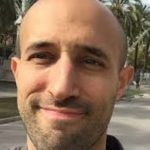 Rev. Ariel Setsudo Pliskin is an ordained Minister in the Zen Peacemaker Order and holds certifications in nonprofit management, yoga instruction and mindfulness facilitation. He is the international Coordinator of the Path of Freedom program, and founded the Stone Soup Café and Unity Tables. He is currently running the Awake Tuesdays sitting group in Deerfield with Fleet Maull and pursuing a Masters of Social Work at Westfield State University. He is also an active member in the local Contact Improvisation dance community.
Rev. Ariel Setsudo Pliskin is an ordained Minister in the Zen Peacemaker Order and holds certifications in nonprofit management, yoga instruction and mindfulness facilitation. He is the international Coordinator of the Path of Freedom program, and founded the Stone Soup Café and Unity Tables. He is currently running the Awake Tuesdays sitting group in Deerfield with Fleet Maull and pursuing a Masters of Social Work at Westfield State University. He is also an active member in the local Contact Improvisation dance community.
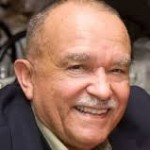
Francisco “Paco” Genkoji Lugoviña, Roshi is an ordained Buddhist priest in the Soto Zen lineage and in the Zen Peacemaker Order, and a board member of Zen Peacemakers International. He is a guiding teacher at the Hudson River Zen Center in Yonkers, New York. He works with gang members and youth and has participated in Bearing Witness Retreats and pilgrimages to Tibet, Auschwitz-Birkenau, India, Sri Lanka, Rwanda, as well as on the streets of New York City and other US cities.

